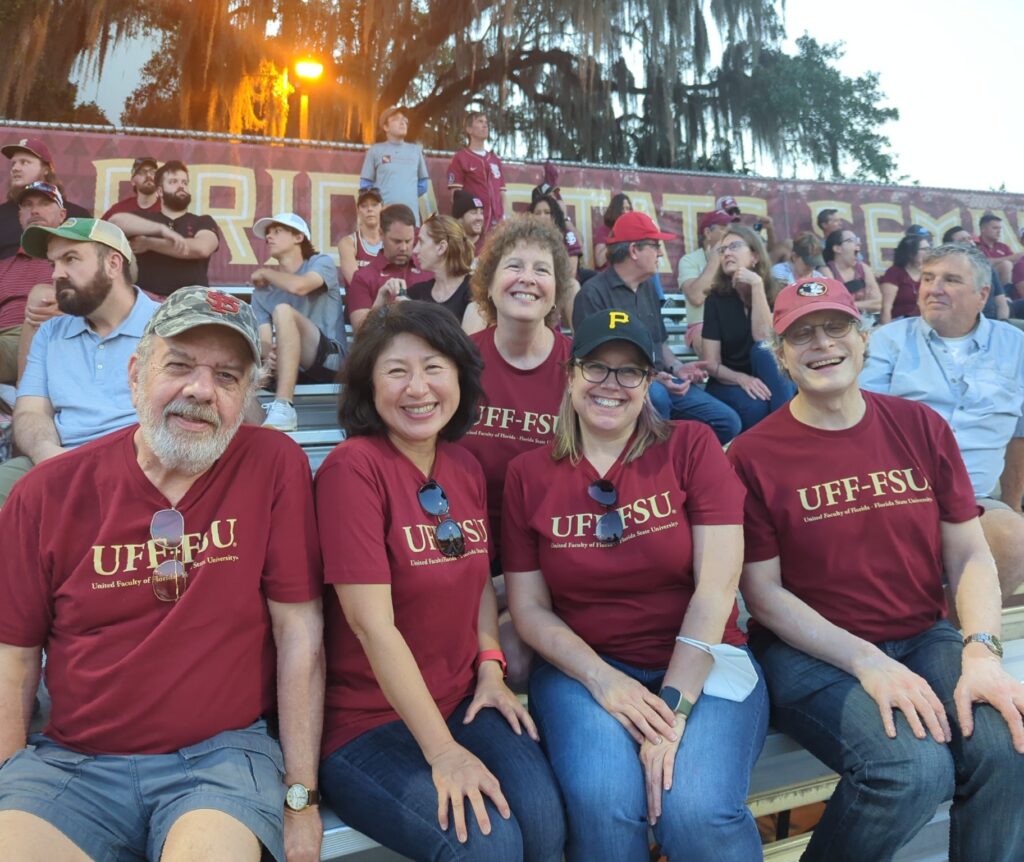Dear Colleagues,
The bargaining teams met last Wednesday to entertain two counter-proposals from the BOT and to hear the UFF response to last week’s verbal offer, along with the presentation of another new proposal.
We first turned to the BOT’s counter-proposal on Article 18 (Inventions and Works). The BOT accepted several of the changes from our last proposal (including removing salary from the definition of “appreciable University support) but retained language specifying that inventions falling within the faculty member’s “field of expertise” are a University-supported effort and thus any proceeds from them must be shared with the University. We had earlier proposed striking the “field of expertise” stipulation as being unduly restrictive and hard to define. The BOT proposal also rejected the UFF-proposed 50/50 division of proceeds in favor of retaining the existing 60/40 split (60% for the University and 40% for the inventor).
The second BOT counter proposal we discussed was for Article 19 (Conflict of Interest), and the teams were joined by Robyn Blank, FSU’s Chief Compliance Officer. The proposal sought to define “field of expertise” (which also figures prominently in Article 18) by identifying it as the basis of the faculty member’s employment, which “generally means as a grouping of courses or research areas that share common or vocational preparation which are typically defined by a degree or degrees.” This isn’t terribly clear to us, but we’ll work it out as negotiations continue. We are a bit worried about existing contract language that we removed and the BOT re-inserted that defines it as a conflict of interest when the private interests of the faculty member conflict with the public interests of the University, as it is unclear what is meant by the University’s public interest. The BOT team said that Article 5 (Academic Freedom) offers protection for free speech, which is the UFF worry, and our counter-proposal may include references to that protection. We also spent quite a bit of time discussing Appendix K, which itemizes reportable and non-reportable activity. There are points of disagreement remaining, and we look forward to working through them.
Article 19 is also where language appears about consensual sexual relationships with students, and the BOT’s new language allows such relationships with graduate students, as long as they are in a different department and no supervisory or evaluative relationship exists, but blanketly prohibits them with undergraduates, even when they are in a different department and there is no supervisory or evaluative component. It seems that our arguments about how impossible it is to define a “romantic relationship” fell on deaf ears: their language continues to include romantic relationships. They accepted our language that creates a carve-out for pre-existing relationships and allows the Provost to create exemptions on a case-by-case basis.
It was the UFF’s turn next, and we began by saying that while we were very pleased that the BOT was willing to drop the idea of reducing the 4-year contracts for some Specialized Faculty (Article 8), we were not yet ready to trade it for the article they would like us to drop (Article 12). It’s too soon to strike a deal, as we still need to hear back on the many proposals we have outstanding.
The UFF presented an initial proposal on Article 22 Sabbatical and Professional Development Leave. Although the basic thrust of the proposal was clear—to move toward a University of California-style plan where faculty earn credits toward non-competitive leaves over time—discussion revealed some inconsistencies that the UFF team needs to resolve.
The session concluded with UFF presenting a proposal on Article 24 (Benefits) that ensconces the Scholarship Program for Dependents and Spouses into the CBA. It has been agreed to as a pilot program in an MOU for four years now, and it seems high time to make it permanent. Our proposal does that and also removes the cap on funds allocated to the program.
The next bargaining session is scheduled for Wed., May 4, from 1:00-4:00. Please note the earlier-than-usual start time (to accommodate a UFF request). Bargaining sessions are open to faculty, and we appreciate having you! Meetings are face-to-face at the FSU Training Center (493 Stadium Drive). We are pleased that faculty are showing up in person and via Zoom. If you would like to attend remotely, please respond to this message and we’ll send you the Zoom link. (Alternatively, if you retained a previous bargaining Zoom link, it will still work.)
Regular bargaining updates can be found at our webpage: https://uff-fsu.org/
The key to a strong Collective Bargaining Agreement is a strong membership base, so if you are not a member, please join! There has never been a more important time for us to stand together. https://uff-fsu.org/wp/join/
All best,
Irene Padavic and Scott Hannahs, Co-Chief Negotiators, UFF-FSU



